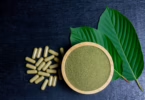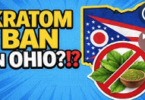Kratom is slyly billed as a tea by head shop owners, but they’re selling it – and people are buying it – for the heroin-like high it provides. Law enforcement is onto it, warning of its dangers.
It’s as dangerous as heroin, but you can walk right into a store in a city or suburb and buy it over the counter.
Parents probably haven’t heard of it yet — and so far, it’s not even technically illegal to sell it if you are calling it a tea, as head shops are. But they’re pitching it as a drug, which is illegal.
Either way, the drug called kratom – pronounced kray-tum — is definitely on law enforcement’s radar.
Online, kratom has created a buzz, with young men recording YouTube testimonials while they are high on it.
As one of them slurs, “Kratom is what they refer to in the medical community as an opiate with a roof where you can only get so high.”
The drug is made from the leaves of trees that grow in Southeast Asia. In this country, it is sold as a pill or as a powder you stir into a beverage.
In small doses, it acts as a stimulant. In higher doses, it becomes a sedative.
The Ohio attorney general’s crime lab is constantly on the watch for this latest illicit drug. Just last month, eight people in central Ohio were indicted for running a large-scale drug operation, which included the sale of kratom.
“It is illegal in Ohio to take it and sell it as a drug,” says Jonathan Fulkerson, deputy chief counsel for Ohio Attorney General Mike DeWine.
While kratom is on the watchlist put out by the U.S. Drug Enforcement Agency, Channel 3 producers found it widely available online, as well as in a number of local head shops.
We went undercover to see how store clerks would describe it. One producer bought a bag of 30 pills for $30 at the Twilight Boutique in Lakewood after the clerk told him the pills could relieve pain and help induce sleep.
“He said it was one of those things where he used it for arthritis,” said the producer. “He said it helped remove the pain.”
Fulkerson noted that kratom is not approved for any medical purpose in the U.S. — including as a pain reliever.
The owner of the Twilight Boutique, Dale Drummond, said later that he had no idea his employees were selling kratom as a drug.
“Thank you very much,” he said when we paid another visit to his store. “I will definitely look into it. I am not aware we were selling it — it’s an all natural tea extract.”
Drummond is facing trial in May on charges that he and others distributed synthetic drugs that were designed to mimic marijuana. He says he stopped offering kratom when he learned of other people getting in trouble for selling it.
“There are stores getting busted for it,” Drummond said. “I don’t want legal stuff (issues), so I pulled it off the shelves till I get more answers.”
At another head shop — the Glass House in Cleveland — we were told to leave, and the owner never returned our calls.
“Kratom is on our radar for the reasons it’s on the DEA’s radar,” says Fulkerson. “It’s a drug of concern.”
Little research has been done on the safety of kratom, but there are reports of people who have used it showing up in emergency rooms complaining of symptoms similar to heroin withdrawal.
Even promoters of kratom warn that daily use can create unpleasant side effects. These include nervousness, aggression, sleeplessness and tremors.
–WKYC






